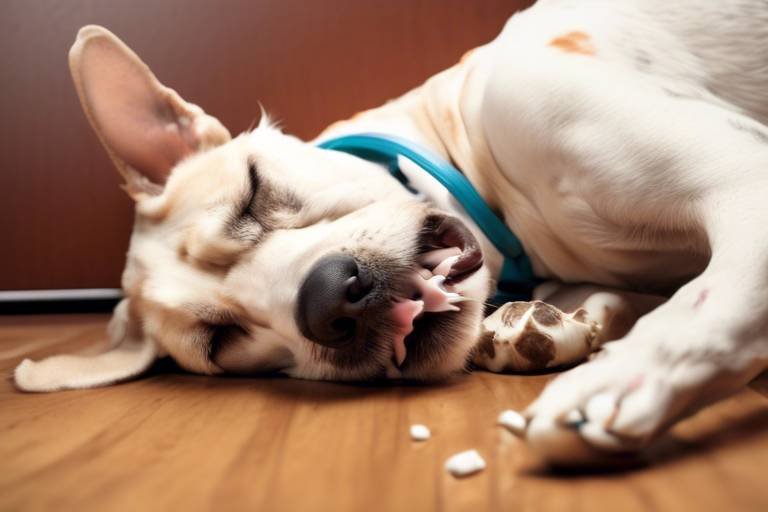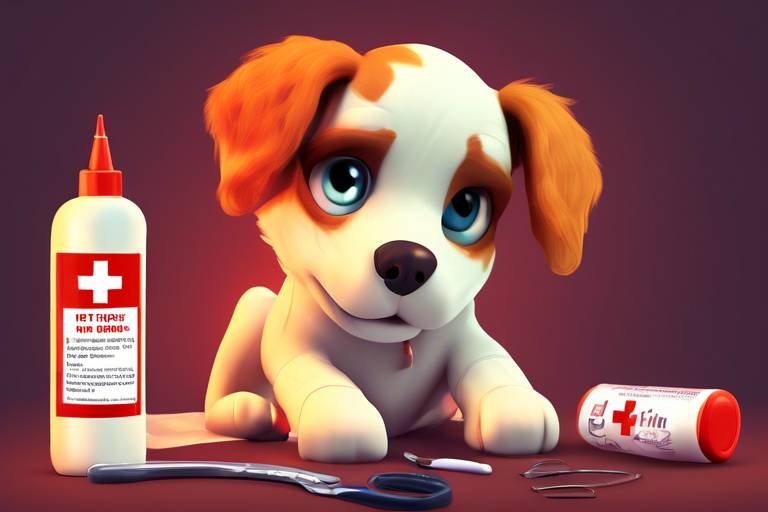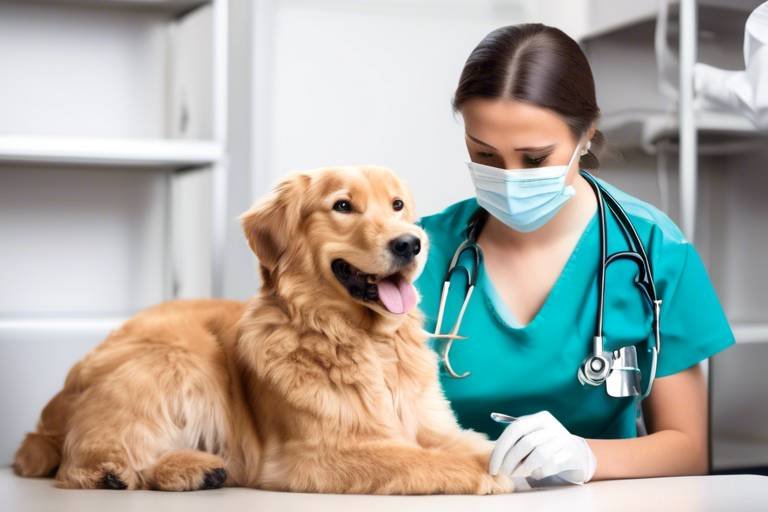What to Do If Your Pet Is Vomiting or Diarrhea
As a pet owner, it can be incredibly distressing to see your furry friend in discomfort. When your pet is vomiting or experiencing diarrhea, it’s crucial to take immediate action. Understanding the situation can mean the difference between a minor issue and a serious health crisis. Your pet relies on you to be their voice and advocate, especially during these uncomfortable times. But what should you do? This article will guide you through essential steps to take when your pet shows these symptoms, helping you ensure their health and well-being.
Recognizing the signs of vomiting and diarrhea in pets is the first step in addressing these issues. You might notice your pet exhibiting unusual behaviors, such as lethargy, a decrease in appetite, or frequent trips to the bathroom. Early recognition can help determine the severity of the situation and the appropriate actions to take for your furry friend. For instance, if your pet is vomiting multiple times or has diarrhea that persists for more than a day, these could be signs of a more serious condition that requires veterinary attention. Always trust your instincts—if something feels off, it’s better to be safe than sorry!
Various factors can lead to vomiting or diarrhea in pets. Understanding these causes is vital for effective treatment and management of your pet's condition. Some common triggers include:
- Dietary Indiscretion: Pets are notorious for eating things they shouldn't, which can upset their stomachs.
- Infections: Bacterial or viral infections can wreak havoc on your pet's gastrointestinal tract.
- Underlying Health Issues: Conditions like pancreatitis or kidney disease can manifest through these symptoms.
Identifying the cause is crucial for effective treatment. For example, if your pet has a food allergy, it’s essential to pinpoint the allergen to prevent future episodes.
Improper diet or sudden changes in food can upset your pet's stomach. Just like us, pets can have sensitive digestive systems. If you recently switched your pet's food or introduced new treats, this might be the culprit. Understanding how diet influences gastrointestinal health can help prevent future occurrences of vomiting and diarrhea. It's like changing your own diet overnight; your body might not react well!
Food allergies can trigger gastrointestinal upset in pets. Identifying potential allergens is essential for managing your pet's diet and preventing recurrent episodes. Common allergens include beef, chicken, dairy, and grains. If you suspect your pet has a food allergy, consider keeping a food diary to track what they eat and any symptoms that arise.
Overeating or consuming spoiled food can lead to digestive distress. Just like a human might feel sick after a binge, pets can experience the same discomfort. Recognizing these behaviors can help pet owners take proactive measures to maintain their pet's health. If your pet tends to scarf down their food, consider using a slow feeder to help them eat at a more manageable pace.
Infections and parasites can cause vomiting and diarrhea in pets. These conditions can be serious and require prompt veterinary attention. Signs of infections might include fever, lethargy, or a sudden change in behavior. Parasites, such as worms, can also lead to gastrointestinal upset. Understanding the signs and symptoms associated with these conditions can facilitate timely veterinary intervention, ensuring your pet gets the help they need.
There are several home remedies pet owners can try to alleviate mild vomiting and diarrhea. These remedies can provide comfort and support while monitoring your pet’s condition closely. Always remember, though, that if symptoms persist, it’s best to consult a veterinarian.
Maintaining hydration is crucial for pets experiencing vomiting or diarrhea. Dehydration can be a serious concern, especially in severe cases. You can encourage your pet to drink water or offer them an electrolyte solution designed for pets. Additionally, consider offering bland foods like boiled chicken and rice to help soothe their digestive system.
Making temporary dietary adjustments can aid in recovery. Knowing what foods to offer can help soothe your pet's digestive system and promote healing. For instance, introducing a bland diet can be beneficial. It’s like giving your stomach a break after a rough night out; sometimes, you just need to ease back into solid foods.
Recognizing when your pet's condition requires professional help is essential. Certain symptoms indicate a more serious issue that necessitates immediate veterinary attention. If your pet shows signs of severe vomiting, persistent diarrhea, or exhibits lethargy, it’s time to call your vet. Understanding these symptoms can help pet owners make informed decisions regarding their pet's health.
If your pet is showing severe symptoms such as blood in vomit or stool, extreme lethargy, or dehydration, don’t wait. These could be signs of a serious condition that needs immediate care.
If vomiting or diarrhea persists, it may signal an underlying health condition. Identifying chronic issues early can lead to better treatment options and improve your pet's quality of life. Regular vet visits are essential for monitoring your pet’s health and catching potential issues before they escalate into serious problems.
Taking proactive steps can help prevent vomiting and diarrhea in pets. Understanding preventive measures can contribute to your pet's overall health and well-being. For example, ensuring a balanced diet tailored to your pet's needs is crucial. Proper nutrition can help maintain digestive health and prevent gastrointestinal issues.
Routine veterinary visits are essential for monitoring your pet's health. Regular check-ups can help catch potential issues before they escalate into serious problems. Think of it as a health check-up for your furry friend; it can save you a lot of trouble down the line!
Ensuring a balanced diet tailored to your pet's needs is crucial. Understanding the importance of proper nutrition can help maintain digestive health and prevent gastrointestinal issues. Consult with your vet about the best diet for your pet’s specific needs, and always be cautious when introducing new foods.
Q: What should I do if my pet vomits once?
A: If your pet vomits once but seems otherwise healthy, monitor them for any additional symptoms. If vomiting persists or they show signs of distress, consult your veterinarian.
Q: How can I tell if my pet is dehydrated?
A: Signs of dehydration include dry gums, lethargy, and loss of skin elasticity. If you suspect dehydration, it's crucial to get your pet to drink water or seek veterinary care.
Q: Are there any foods I should avoid giving my pet?
A: Yes, avoid giving your pet foods that are toxic to them, such as chocolate, grapes, and onions. Always check with your veterinarian about safe food options.
Q: When should I take my pet to the vet?
A: If your pet shows severe symptoms, such as persistent vomiting or diarrhea, blood in vomit or stool, or extreme lethargy, seek veterinary care immediately.

Recognizing Symptoms
This article provides essential steps to take when your pet experiences vomiting or diarrhea, including causes, home remedies, when to seek veterinary care, and preventive measures to ensure your pet's health.
Understanding the signs of vomiting and diarrhea in pets is crucial. Early recognition can help determine the severity of the situation and the appropriate actions to take for your furry friend. When your pet is feeling unwell, they can’t exactly tell you what’s wrong, so it’s up to you to be their voice. Look for visual clues and changes in behavior that might indicate distress.
Some common symptoms that pet owners should be vigilant about include:
- Vomiting: This can range from occasional to frequent, and it may contain food, bile, or even blood.
- Diarrhea: Loose or watery stools can be a sign of digestive upset, and it may also be accompanied by a strong odor.
- Lethargy: If your pet seems unusually tired or disinterested in their favorite activities, it could be a red flag.
- Loss of Appetite: A sudden change in eating habits can indicate that something is amiss.
- Abdominal Pain: If your pet is sensitive to touch around their belly or is pacing, they might be experiencing discomfort.
Recognizing these symptoms early can make a significant difference. For instance, if your dog vomits once but seems otherwise normal, it might not be cause for alarm. However, if the vomiting continues or is accompanied by other symptoms like diarrhea or lethargy, it’s time to take action. Consider keeping a symptom diary to track changes over time, which can be immensely helpful when discussing your pet’s condition with a veterinarian.
It's also important to note that the severity and frequency of these symptoms can vary between different pets. For example, a small breed dog might become dehydrated more quickly than a larger breed, so always consider your pet's size and overall health when assessing their condition.
In summary, being observant and proactive can help you catch potential issues before they escalate. If you notice any concerning symptoms, don't hesitate to reach out to your veterinarian for guidance. After all, your pet relies on you to advocate for their health and well-being!
Various factors can lead to vomiting or diarrhea in pets, including dietary indiscretion, infections, and underlying health issues. Identifying the cause is vital for effective treatment and management of your pet's condition.
Improper diet or sudden changes in food can upset your pet's stomach. Understanding how diet influences gastrointestinal health can help prevent future occurrences of vomiting and diarrhea.
Food allergies can trigger gastrointestinal upset in pets. Identifying potential allergens is essential for managing your pet's diet and preventing recurrent vomiting or diarrhea episodes.
Overeating or consuming spoiled food can lead to digestive distress. Recognizing these behaviors can help pet owners take proactive measures to maintain their pet's health.
Infections and parasites can cause vomiting and diarrhea in pets. Understanding the signs and symptoms associated with these conditions can facilitate timely veterinary intervention.
There are several home remedies pet owners can try to alleviate mild vomiting and diarrhea. These remedies can provide comfort and support while monitoring your pet’s condition closely.
Maintaining hydration is crucial for pets experiencing vomiting or diarrhea. Learning effective hydration techniques can help prevent dehydration and support your pet's recovery.
Making temporary dietary adjustments can aid in recovery. Knowing what foods to offer can help soothe your pet's digestive system and promote healing.
Recognizing when your pet's condition requires professional help is essential. Knowing the warning signs can ensure timely intervention and prevent serious health complications.
Certain symptoms indicate a more serious issue that necessitates immediate veterinary attention. Understanding these symptoms can help pet owners make informed decisions regarding their pet's health.
If vomiting or diarrhea persists, it may signal an underlying health condition. Identifying chronic issues early can lead to better treatment options and improve your pet's quality of life.
Taking proactive steps can help prevent vomiting and diarrhea in pets. Understanding preventive measures can contribute to your pet's overall health and well-being.
Routine veterinary visits are essential for monitoring your pet's health. Regular check-ups can help catch potential issues before they escalate into serious problems.
Ensuring a balanced diet tailored to your pet's needs is crucial. Understanding the importance of proper nutrition can help maintain digestive health and prevent gastrointestinal issues.
Q: What should I do if my pet vomits once?
A: If your pet vomits once but seems otherwise normal, monitor them for any additional symptoms. If vomiting persists or is accompanied by other symptoms, consult your veterinarian.
Q: How can I tell if my pet is dehydrated?
A: Signs of dehydration include dry gums, excessive panting, and loss of skin elasticity. If you suspect dehydration, contact your veterinarian immediately.
Q: Are there any specific foods I should avoid giving my pet?
A: Yes, avoid giving your pet table scraps, spoiled food, or any food known to cause allergies. Stick to a balanced diet recommended by your veterinarian.
Q: When should I take my pet to the vet?
A: If your pet shows severe symptoms such as continuous vomiting or diarrhea, lethargy, or if they refuse to eat for more than 24 hours, seek veterinary care right away.

Common Causes
When it comes to our beloved pets, understanding the underlying reasons for vomiting or diarrhea can be a game changer. Just like us, our furry friends can experience a range of gastrointestinal issues, and pinpointing the cause is essential for effective treatment. There are numerous factors that can lead to these distressing symptoms, and being aware of them can help you act swiftly and appropriately. Let's delve into some of the most common culprits that could be causing your pet's discomfort.
One of the primary reasons pets experience vomiting or diarrhea is dietary indiscretion. This term refers to when pets munch on something they shouldn't, whether it's a sneaky snack from the trash or a sudden change in their regular food. Just like how eating that leftover pizza might upset your stomach, pets can also suffer when they indulge in inappropriate foods. It's essential to monitor what your pet eats and to maintain a consistent diet to avoid gastrointestinal upset.
Another significant factor is infections and parasites. Pets can pick up infections from various sources, including contaminated food, water, or contact with other animals. Parasites like worms or giardia can wreak havoc on your pet's digestive system, leading to vomiting and diarrhea. If you notice these symptoms, it’s crucial to keep an eye out for other signs such as lethargy, weight loss, or a bloated abdomen, as these could indicate a more severe underlying issue.
Dietary issues also play a vital role in gastrointestinal health. For example, food allergies can trigger a range of symptoms, including vomiting and diarrhea. If your pet has a food allergy, they may react negatively to certain ingredients, leading to discomfort and distress. Identifying potential allergens is essential for managing your pet's diet and preventing recurrent episodes. Keep a close watch on your pet's reactions to different foods, and consult your veterinarian for possible allergy testing if you suspect this might be the issue.
Moreover, overeating or eating spoiled food can lead to digestive distress. Just like how overindulging at a buffet can leave you feeling queasy, pets can also suffer if they eat too much or consume food that has gone bad. It's crucial to regulate your pet's portions and ensure that their food is fresh. If your pet tends to be a little too enthusiastic at mealtime, consider using a slow feeder to help control their eating pace and prevent overeating.
In summary, recognizing the common causes of vomiting and diarrhea in pets is essential for effective management and treatment. Whether it’s dietary indiscretion, infections, parasites, food allergies, or overeating, each cause requires a different approach. If your pet shows any signs of distress, it’s always best to consult with your veterinarian to determine the appropriate course of action.
- What should I do if my pet is vomiting or has diarrhea? - Monitor their symptoms closely, ensure they stay hydrated, and consult your veterinarian if symptoms persist.
- How can I prevent my pet from having gastrointestinal issues? - Maintain a consistent diet, avoid giving them table scraps, and schedule regular veterinary check-ups.
- When should I be concerned about my pet's vomiting or diarrhea? - If your pet shows severe symptoms such as lethargy, blood in the stool, or if vomiting persists for more than 24 hours, seek veterinary care immediately.
Dietary Issues
When it comes to our beloved pets, their diet plays a pivotal role in their overall health. Just like us, pets can experience digestive turmoil when their meals don’t sit right. Dietary issues can manifest in various ways, and understanding these can help pet owners take proactive measures to keep their furry friends happy and healthy.
One of the most common culprits of vomiting and diarrhea is improper diet. This can include sudden changes in food, which can shock a pet's digestive system. Imagine switching from a hearty steak dinner to a bowl of salad overnight; it’s bound to cause some discomfort! To avoid this, it's best to transition to new foods gradually. This means mixing the new food with the old food over several days, allowing your pet's digestive system to acclimate.
Moreover, food allergies can be another significant factor leading to gastrointestinal distress. Pets can develop sensitivities to certain ingredients, such as chicken, beef, or grains. Identifying these allergens is crucial. If you notice your pet frequently experiencing upset stomachs after meals, it may be time to consult with your veterinarian about an elimination diet to pinpoint the problem ingredients.
In addition to allergies, overeating can also lead to digestive issues. Pets, especially those who have access to food throughout the day, can sometimes indulge a little too much. Overeating stretches the stomach and can lead to vomiting or diarrhea. Moreover, if your pet has a habit of scavenging or sneaking a bite of spoiled food, it can exacerbate the situation. It's essential to monitor their eating habits closely and ensure they are consuming appropriate portions.
In summary, dietary issues can lead to significant health concerns for pets. As a responsible pet owner, it’s vital to:
- Transition foods gradually to prevent digestive shock.
- Identify and eliminate potential food allergens.
- Monitor portion sizes to avoid overeating.
- Keep an eye on what they might be sneaking from the kitchen or trash!
By paying attention to these dietary factors, you can help prevent vomiting and diarrhea in your pet, ensuring they lead a healthy and vibrant life.
Q: What should I do if my pet vomits once?
A: If your pet vomits once but seems otherwise healthy, monitor them for any further symptoms. Ensure they have access to fresh water and consider withholding food for a few hours. If vomiting persists, consult your veterinarian.
Q: How can I tell if my pet has a food allergy?
A: Signs of food allergies can include chronic vomiting, diarrhea, itching, or skin irritations. An elimination diet supervised by a vet can help identify the specific allergen.
Q: When should I take my pet to the vet for vomiting or diarrhea?
A: If your pet shows severe symptoms such as lethargy, blood in vomit or stool, or if vomiting or diarrhea persists for more than 24 hours, it’s essential to seek veterinary care immediately.
Food Allergies
Food allergies in pets can be a tricky puzzle to solve. Imagine your furry friend, full of energy one moment, and then suddenly experiencing discomfort the next. It’s not just a simple upset stomach; it could be a reaction to something they’ve eaten. Pets can develop allergies to various ingredients in their food, just like humans do. Common culprits include proteins such as beef, chicken, or dairy, as well as grains like wheat. Recognizing the signs of food allergies is crucial because they can manifest in various ways, including vomiting, diarrhea, and even skin irritations.
When your pet has a food allergy, their immune system mistakenly identifies a harmless substance as a threat. This can lead to inflammation in the digestive tract, resulting in gastrointestinal distress. It's important to note that food allergies often develop over time, meaning your pet might have enjoyed a particular food for years before suddenly reacting to it. If you notice your pet exhibiting symptoms like excessive itching, ear infections, or gastrointestinal upset after eating certain foods, it’s time to consider a food allergy.
Identifying the specific allergen can be challenging but is essential for managing your pet’s diet effectively. A process known as an elimination diet can be very helpful. This involves removing all potential allergens from your pet's diet for a period, usually around 8-12 weeks, and then gradually reintroducing them one at a time. By monitoring your pet closely during this period, you can pinpoint which ingredient is causing the problem.
Here’s a quick overview of common food allergens for pets:
| Common Food Allergens | Symptoms |
|---|---|
| Beef | Vomiting, diarrhea, itching |
| Chicken | Skin irritations, gastrointestinal upset |
| Dairy | Bloating, gas, diarrhea |
| Wheat | Itching, ear infections |
Once you identify the allergens, you can tailor your pet's diet to avoid these ingredients, ensuring they remain healthy and happy. It’s also worth consulting with your veterinarian, who can recommend hypoallergenic diets or specific food brands designed for pets with allergies. Remember, just like with us humans, a balanced diet is key to maintaining your pet’s overall health and preventing future allergic reactions.
- How do I know if my pet has a food allergy? Look for symptoms such as vomiting, diarrhea, itching, or skin irritations after eating.
- Can food allergies develop suddenly in pets? Yes, pets can develop allergies over time, even to foods they have eaten without issue previously.
- What should I do if I suspect my pet has a food allergy? Consult your veterinarian and consider an elimination diet to identify the allergen.
Overeating or Eating Spoiled Food
Overeating or consuming spoiled food can be a significant culprit behind your pet’s digestive woes. Just like humans, pets can experience discomfort and gastrointestinal distress when they indulge too much or eat something that has gone bad. Imagine how you feel after a big feast; now think about your furry friend experiencing that same discomfort multiplied by their smaller size! This can lead to symptoms such as vomiting or diarrhea, which can be distressing for both the pet and the owner.
Pets often don't know when to stop eating, especially if they are presented with a feast of delicious food. Whether it’s a holiday meal or just a little extra treat, they can easily overindulge. This can cause their stomachs to rebel, leading to a situation where they might vomit or suffer from diarrhea. It's important to monitor their food intake closely, as some pets may eat rapidly, leading to further complications like bloating.
On the other hand, spoiled food can be just as dangerous. Pets are curious creatures and often scavenge for anything that smells interesting. If they come across food that has spoiled, it can introduce harmful bacteria into their system, causing serious digestive issues. Spoiled food can harbor toxins that can make your pet feel ill, resulting in symptoms like:
- Vomiting
- Diarrhea
- Abdominal pain
- Lethargy
To help prevent these issues, it’s essential to establish healthy eating habits for your pet. Here are some strategies to consider:
- **Portion Control**: Measure out your pet's food according to their dietary needs to prevent overeating.
- **Regular Feeding Schedule**: Stick to a consistent feeding schedule to help regulate their appetite.
- **Monitor Treats**: Be mindful of how many treats you give and ensure they are appropriate for your pet’s size and dietary needs.
- **Food Safety**: Always check the expiration dates on pet food and store it properly to avoid spoilage.
By taking these preventive measures, you can help your pet avoid the discomfort of overeating or consuming spoiled food. Remember, a little caution can go a long way in keeping your furry friend healthy and happy!
Q: What should I do if my pet vomits after overeating?
A: If your pet vomits after overeating, ensure they have access to fresh water and monitor their condition. If vomiting persists or is accompanied by other symptoms like lethargy or diarrhea, consult your veterinarian.
Q: How can I tell if food is spoiled?
A: Signs of spoiled food include an off smell, discoloration, or mold. Always check for these signs before feeding your pet.
Q: Can I give my pet bland food after they vomit?
A: Yes, once your pet seems stable, you can offer bland food such as boiled chicken and rice in small amounts to help settle their stomach.
Infections and Parasites
This article provides essential steps to take when your pet experiences vomiting or diarrhea, including causes, home remedies, when to seek veterinary care, and preventive measures to ensure your pet's health.
Understanding the signs of vomiting and diarrhea in pets is crucial. Early recognition can help determine the severity of the situation and the appropriate actions to take for your furry friend.
Various factors can lead to vomiting or diarrhea in pets, including dietary indiscretion, infections, and underlying health issues. Identifying the cause is vital for effective treatment and management of your pet's condition.
Improper diet or sudden changes in food can upset your pet's stomach. Understanding how diet influences gastrointestinal health can help prevent future occurrences of vomiting and diarrhea.
Food allergies can trigger gastrointestinal upset in pets. Identifying potential allergens is essential for managing your pet's diet and preventing recurrent vomiting or diarrhea episodes.
Overeating or consuming spoiled food can lead to digestive distress. Recognizing these behaviors can help pet owners take proactive measures to maintain their pet's health.
Infections and parasites are not just nuisances; they can be serious health threats to your furry companions. When a pet is infected with a virus, bacteria, or parasites, their gastrointestinal system can go haywire, leading to symptoms such as vomiting and diarrhea. It's like having an uninvited guest that wreaks havoc on a peaceful home! Common culprits include:
- Parvovirus: A highly contagious virus that primarily affects dogs, causing severe gastrointestinal distress.
- Giardia: A microscopic parasite that can cause diarrhea and is often transmitted through contaminated water.
- Salmonella: A bacterial infection that can arise from raw food diets or contaminated food sources.
- Worms: Various types of intestinal worms, such as roundworms and hookworms, can lead to digestive issues.
Recognizing the signs of these infections is crucial. Symptoms may include:
- Frequent vomiting
- Persistent diarrhea, possibly with blood
- Lethargy and weakness
- Loss of appetite
If you notice any of these symptoms, it’s essential to consult your veterinarian promptly. They can perform tests to identify the exact cause and recommend appropriate treatment. Ignoring these signs can lead to dehydration and more severe health complications, so don’t wait until it’s too late!
There are several home remedies pet owners can try to alleviate mild vomiting and diarrhea. These remedies can provide comfort and support while monitoring your pet’s condition closely.
Maintaining hydration is crucial for pets experiencing vomiting or diarrhea. Learning effective hydration techniques can help prevent dehydration and support your pet's recovery.
Making temporary dietary adjustments can aid in recovery. Knowing what foods to offer can help soothe your pet's digestive system and promote healing.
Recognizing when your pet's condition requires professional help is essential. Knowing the warning signs can ensure timely intervention and prevent serious health complications.
Certain symptoms indicate a more serious issue that necessitates immediate veterinary attention. Understanding these symptoms can help pet owners make informed decisions regarding their pet's health.
If vomiting or diarrhea persists, it may signal an underlying health condition. Identifying chronic issues early can lead to better treatment options and improve your pet's quality of life.
Taking proactive steps can help prevent vomiting and diarrhea in pets. Understanding preventive measures can contribute to your pet's overall health and well-being.
Routine veterinary visits are essential for monitoring your pet's health. Regular check-ups can help catch potential issues before they escalate into serious problems.
Ensuring a balanced diet tailored to your pet's needs is crucial. Understanding the importance of proper nutrition can help maintain digestive health and prevent gastrointestinal issues.
Q: How can I tell if my pet's vomiting or diarrhea is serious?
A: Look for signs such as blood in the vomit or stool, lethargy, or persistent symptoms lasting more than 24 hours. If you notice these, it's best to contact your veterinarian.
Q: Can I give my pet over-the-counter medications for vomiting or diarrhea?
A: It's important to consult your veterinarian before administering any medications, as some can be harmful to pets.
Q: What should I do if my pet is dehydrated?
A: Encourage your pet to drink water or offer an electrolyte solution made for pets. If they refuse to drink or show signs of severe dehydration, seek veterinary care immediately.

Home Remedies
When your beloved pet is experiencing vomiting or diarrhea, it can be a distressing time for both of you. Fortunately, there are several that you can try to help alleviate their discomfort and support their recovery. However, it's essential to remember that these remedies are best suited for mild cases. If your pet's symptoms persist or worsen, seeking veterinary care is always the best course of action.
One of the most crucial aspects of caring for a pet with vomiting or diarrhea is ensuring they stay hydrated. Dehydration can become a serious concern, especially if your pet is losing fluids rapidly. You can encourage your pet to drink by offering fresh water frequently. If your pet refuses to drink, consider using a hydration solution specifically designed for pets, which can be found at most pet stores. Another effective method is to offer ice chips or ice cubes, which can entice them to lick and hydrate.
In addition to hydration, making temporary dietary adjustments can significantly aid in your pet's recovery. After a period of vomiting, it's wise to allow their stomach to settle for about 12 hours. Following this, you can introduce a bland diet. Foods such as plain boiled chicken (without skin or bones) and white rice are excellent choices. Gradually reintroduce their regular food after a few days, but ensure you do this slowly to avoid upsetting their stomach again.
Another effective home remedy involves the use of pumpkin puree. This might sound surprising, but pure canned pumpkin (not the spiced pie filling) is a fantastic source of fiber that can help firm up your pet's stool. Just a spoonful mixed into their food can work wonders. Additionally, probiotics designed for pets can also help restore the natural balance of bacteria in their gut, promoting a healthier digestive system.
It's also important to monitor your pet's behavior closely. Look for signs of improvement or worsening symptoms. If they seem lethargic, continue vomiting, or exhibit blood in their stool, it's time to consult your veterinarian. Always keep in mind that while these home remedies can provide comfort, they are not substitutes for professional medical advice.
- What should I do if my pet refuses to eat or drink?
If your pet refuses food or water for more than 24 hours, it's crucial to consult a veterinarian. Dehydration can escalate quickly, and professional guidance is essential. - Can I give my pet over-the-counter medications?
It's best to avoid giving your pet any human medications without consulting a vet, as many can be toxic to animals. - How long should I wait to see improvement with home remedies?
If your pet's condition does not improve within 24 hours of trying home remedies, or if it worsens, seek veterinary care immediately.
Hydration Techniques
This article provides essential steps to take when your pet experiences vomiting or diarrhea, including causes, home remedies, when to seek veterinary care, and preventive measures to ensure your pet's health.
Understanding the signs of vomiting and diarrhea in pets is crucial. Early recognition can help determine the severity of the situation and the appropriate actions to take for your furry friend.
Various factors can lead to vomiting or diarrhea in pets, including dietary indiscretion, infections, and underlying health issues. Identifying the cause is vital for effective treatment and management of your pet's condition.
Improper diet or sudden changes in food can upset your pet's stomach. Understanding how diet influences gastrointestinal health can help prevent future occurrences of vomiting and diarrhea.
Food allergies can trigger gastrointestinal upset in pets. Identifying potential allergens is essential for managing your pet's diet and preventing recurrent vomiting or diarrhea episodes.
Overeating or consuming spoiled food can lead to digestive distress. Recognizing these behaviors can help pet owners take proactive measures to maintain their pet's health.
Infections and parasites can cause vomiting and diarrhea in pets. Understanding the signs and symptoms associated with these conditions can facilitate timely veterinary intervention.
There are several home remedies pet owners can try to alleviate mild vomiting and diarrhea. These remedies can provide comfort and support while monitoring your pet’s condition closely.
Maintaining hydration is crucial for pets experiencing vomiting or diarrhea. When your furry friend is losing fluids rapidly, it's like watching a balloon slowly deflate; you need to act fast to keep it from collapsing completely! To help your pet stay hydrated, consider the following techniques:
- Fresh Water: Ensure your pet has access to clean, fresh water at all times. Sometimes pets are reluctant to drink, especially if they associate water with feeling unwell, so try offering it in a different bowl or even from your hand.
- Electrolyte Solutions: You can use pet-safe electrolyte solutions to replenish lost fluids. These solutions can be found at pet stores or through your veterinarian. Just like humans, pets need to restore their electrolyte balance!
- Ice Chips: If your pet is hesitant to drink, try offering ice chips. This can make the process more engaging and can encourage them to consume fluids without overwhelming their stomach.
- Wet Food: If your pet eats dry kibble, consider switching to wet food temporarily. Not only does it provide hydration, but it can also be gentler on their stomach.
It's essential to monitor your pet’s hydration status closely. Look for signs of dehydration, such as dry gums, lethargy, or a lack of skin elasticity. If you pinch the skin on the back of their neck and it doesn’t snap back into place quickly, it’s a red flag that your pet needs more fluids. If you notice any of these symptoms, it’s time to consult your veterinarian.
Recognizing when your pet's condition requires professional help is essential. Knowing the warning signs can ensure timely intervention and prevent serious health complications.
Certain symptoms indicate a more serious issue that necessitates immediate veterinary attention. Understanding these symptoms can help pet owners make informed decisions regarding their pet's health.
If vomiting or diarrhea persists, it may signal an underlying health condition. Identifying chronic issues early can lead to better treatment options and improve your pet's quality of life.
Taking proactive steps can help prevent vomiting and diarrhea in pets. Understanding preventive measures can contribute to your pet's overall health and well-being.
Routine veterinary visits are essential for monitoring your pet's health. Regular check-ups can help catch potential issues before they escalate into serious problems.
Ensuring a balanced diet tailored to your pet's needs is crucial. Understanding the importance of proper nutrition can help maintain digestive health and prevent gastrointestinal issues.
Q: How can I tell if my pet is dehydrated?
A: Look for dry gums, lethargy, or skin that doesn’t bounce back quickly when pinched. If you notice these signs, consult your veterinarian.
Q: Can I give my pet human electrolyte drinks?
A: No, many human electrolyte drinks contain ingredients that are harmful to pets. Always use pet-safe solutions.
Q: How long should I wait before seeking veterinary care?
A: If your pet's vomiting or diarrhea lasts more than 24 hours, or if they show severe symptoms, seek veterinary care immediately.
Dietary Adjustments
When your furry friend is experiencing vomiting or diarrhea, one of the most effective strategies to aid in their recovery is to make temporary dietary adjustments. This approach not only helps soothe their digestive system but also promotes healing. Think of it as giving their stomach a little vacation from the usual hustle and bustle of digestion. The goal here is to provide gentle, easily digestible foods that can help stabilize their condition.
Start by introducing a bland diet, which is often recommended by veterinarians. This typically includes foods such as boiled chicken (without skin or bones) and white rice. These ingredients are not only gentle on the stomach but also provide the necessary nutrients to keep your pet's energy levels up while they recover. Gradually reintroducing their regular food after a few days can help you gauge how well their digestive system is responding. Here’s a simple breakdown of the process:
| Days | Diet |
|---|---|
| 1-2 | Bland diet (boiled chicken and rice) |
| 3-4 | Mix in small amounts of regular food |
| 5 and beyond | Gradually return to regular diet if no symptoms persist |
During this adjustment period, it's crucial to monitor your pet's response to the new diet. If their symptoms improve, you can continue with the bland diet for a few more days before slowly transitioning back to their regular food. However, if you notice any signs of distress or if the vomiting or diarrhea persists, it’s time to consult your veterinarian.
Additionally, consider incorporating probiotics into your pet's diet. Probiotics can help restore the balance of healthy bacteria in their gut, which is often disrupted during episodes of gastrointestinal distress. You can find pet-specific probiotic supplements at your local pet store or through your veterinarian. Just make sure to follow the recommended dosage for your pet's size.
Lastly, always ensure that your pet has access to clean, fresh water. Hydration is key when dealing with vomiting and diarrhea, as these conditions can quickly lead to dehydration. You can also offer an electrolyte solution designed for pets to help replenish lost fluids and minerals. Remember, a little extra care in their diet can go a long way in helping your pet bounce back to their happy, playful self!
- How long should I keep my pet on a bland diet? Generally, 2-4 days is sufficient, but always monitor their condition and consult your vet if symptoms persist.
- Can I give my pet over-the-counter medications? It's best to avoid giving any medications without veterinary guidance, as some can be harmful.
- What signs indicate I should see a vet? If your pet shows severe lethargy, blood in their vomit or diarrhea, or if symptoms last more than 24 hours, seek help immediately.

When to Seek Veterinary Care
Recognizing when your pet's condition requires professional help is essential for their health and well-being. While occasional vomiting or diarrhea might not be a cause for alarm, there are specific situations where immediate veterinary care is crucial. It's important to be vigilant and aware of the signs that indicate your furry friend may need professional intervention.
First and foremost, if your pet exhibits severe symptoms, it's time to act. These symptoms can include:
- Persistent vomiting that lasts more than a few hours.
- Bloody diarrhea or vomit, which can indicate serious internal issues.
- Signs of dehydration, such as dry gums, lethargy, or excessive thirst.
- Abdominal pain, which may manifest as whining, restlessness, or a reluctance to be touched.
- Loss of appetite for more than a day.
Additionally, if your pet is a young puppy or kitten, or if they are elderly or have pre-existing health conditions, they are at a higher risk for complications. In these cases, even mild symptoms should be addressed promptly. It's like driving a car with a warning light on; you wouldn’t ignore it, right? The same goes for your pet's health.
Another important factor to consider is the duration of the symptoms. If vomiting or diarrhea persists for more than 24 hours, it can lead to dehydration and other serious health issues. In such cases, it's better to err on the side of caution and consult your veterinarian. They can provide a thorough examination and may recommend diagnostic tests to uncover any underlying problems.
If your pet has been diagnosed with chronic conditions like diabetes or kidney disease, any sudden changes in their gastrointestinal behavior should be taken seriously. These changes could signal a worsening of their condition or the development of a new issue that requires medical attention. For these pets, regular monitoring and prompt veterinary care are essential to maintaining their quality of life.
In summary, while some cases of vomiting or diarrhea can be managed at home, being aware of the warning signs is key to ensuring your pet receives the care they need. If you're ever in doubt, it’s always best to consult your veterinarian. After all, when it comes to our beloved pets, it’s better to be safe than sorry.
- What should I do if my pet vomits once?
If your pet vomits once but seems otherwise healthy, monitor them for any additional symptoms. Ensure they stay hydrated and consider withholding food for a few hours. - How can I tell if my pet is dehydrated?
Signs of dehydration include dry gums, excessive thirst, and lethargy. You can also check skin elasticity by gently pinching the skin; if it doesn't return to normal quickly, your pet may be dehydrated. - Can I give my pet over-the-counter medications?
It's crucial to consult your veterinarian before administering any medications, as some human medications can be toxic to pets. - How can I prevent vomiting and diarrhea in my pet?
Maintaining a balanced diet, avoiding sudden food changes, and ensuring regular veterinary check-ups can help prevent gastrointestinal issues.
Severe Symptoms
When it comes to our furry companions, recognizing severe symptoms is crucial for their well-being. If your pet is experiencing vomiting or diarrhea, there are specific signs that should raise a red flag. For instance, if you notice your pet is vomiting multiple times in a short period, this could indicate a more serious issue. Similarly, if the diarrhea is persistent, watery, or contains blood, it’s essential to act swiftly. These symptoms can be indicative of underlying health problems that require immediate veterinary attention.
Another severe symptom to watch for is lethargy. If your once playful pup or curious cat suddenly becomes inactive and shows no interest in their favorite activities, it could be a sign of dehydration or a more serious condition. Additionally, if your pet refuses to eat or drink for more than 24 hours, this is a concerning sign that should not be ignored. It's almost like a warning light on your dashboard; you wouldn't ignore it, right?
To help you keep track of these severe symptoms, here’s a quick reference table:
| Symptom | Possible Implications |
|---|---|
| Repeated vomiting | Potential obstruction or severe infection |
| Bloody diarrhea | Intestinal parasites or serious gastrointestinal issues |
| Lethargy | Dehydration or systemic illness |
| Refusal to eat/drink | Serious underlying health issues |
In conclusion, staying vigilant and aware of these severe symptoms can make a significant difference in your pet's health. If you observe any of these signs, it's vital to consult your veterinarian without delay. Remember, early intervention can often lead to better outcomes and a quicker recovery for your beloved pet.
- What should I do if my pet is vomiting or has diarrhea? Start by monitoring their symptoms and hydration levels. If symptoms persist or worsen, consult your veterinarian.
- How can I tell if my pet is dehydrated? Look for signs such as dry gums, excessive panting, or skin that doesn’t return to its normal position when pinched.
- Can I give my pet over-the-counter medications? It's best to consult your veterinarian before giving any medications to ensure they are safe and appropriate for your pet.
- What are some common dietary changes I can make? Gradually introduce a bland diet, like boiled chicken and rice, but always consult your vet for tailored advice.
Chronic Conditions
When your beloved pet experiences recurring episodes of vomiting or diarrhea, it’s crucial to consider the possibility of . These persistent issues can often signal underlying health problems that require immediate attention. For instance, conditions such as inflammatory bowel disease (IBD), pancreatitis, or even kidney disease can manifest through these symptoms. If your pet's gastrointestinal distress lasts more than a day or two, it’s time to take a closer look.
Chronic vomiting or diarrhea can lead to significant health complications, including dehydration and nutritional deficiencies. The longer these symptoms persist, the more serious the consequences can become. It’s essential to monitor your pet closely for any additional signs that may accompany their gastrointestinal issues. Symptoms such as lethargy, weight loss, or changes in appetite should never be ignored, as they can indicate a more severe underlying condition.
In many cases, chronic conditions can be diagnosed through a combination of veterinary examinations, blood tests, and sometimes even ultrasound. These diagnostic tools help veterinarians identify the root cause of your pet's discomfort. For example, if your pet is diagnosed with IBD, a tailored treatment plan can be developed that may include special diets, medications, and regular follow-ups to manage the condition effectively.
It’s also important to note that some chronic conditions may require ongoing management. This could involve dietary restrictions, regular medication, or lifestyle adjustments to ensure your pet remains comfortable and healthy. Here are a few signs that could indicate a chronic condition:
- Frequent episodes of vomiting or diarrhea
- Weight loss or failure to gain weight
- Persistent lethargy or lack of energy
- Changes in appetite or drinking habits
As a pet owner, being vigilant about these signs can make all the difference. Early intervention can lead to better outcomes and a higher quality of life for your furry friend. If you notice any of these symptoms persisting, don’t hesitate to reach out to your veterinarian. They can provide the necessary support and guidance to help your pet through these challenging times.
Here are some common questions that pet owners have regarding vomiting and diarrhea in pets:
- What should I do if my pet vomits or has diarrhea?
Monitor their condition closely, ensure they stay hydrated, and consider dietary adjustments. If symptoms persist, consult your veterinarian. - How can I tell if my pet needs to see a vet?
Look for severe symptoms such as blood in vomit or stool, extreme lethargy, or if vomiting/diarrhea lasts more than 24 hours. - Can I give my pet over-the-counter medications?
It's best to consult your veterinarian before giving any medications, as some can be harmful to pets. - What dietary changes can help my pet?
Consider bland diets like boiled chicken and rice, but always consult your vet for personalized advice.

Preventive Measures
Taking proactive steps can significantly reduce the risk of your pet experiencing vomiting and diarrhea. Just like we take measures to stay healthy, our furry companions require the same level of care and attention. Implementing preventive measures not only contributes to their overall well-being but also saves you from the stress of dealing with sudden health issues. So, what can you do to keep your pet happy and healthy?
First and foremost, regular veterinary check-ups are crucial. These visits allow your vet to monitor your pet's health and catch potential problems before they escalate. Think of it as a routine maintenance check for your car; a little attention can prevent major breakdowns later on. During these visits, your vet can provide valuable insights into your pet's specific health needs, including vaccinations and parasite control.
Another essential aspect of preventive care is ensuring a proper diet and nutrition. Just like humans, pets thrive on a balanced diet tailored to their specific needs. A diet rich in quality proteins, healthy fats, and essential vitamins can significantly impact your pet's digestive health. If you're unsure about what constitutes a balanced diet for your pet, consult your veterinarian for personalized recommendations.
Moreover, it's vital to be cautious about sudden changes in your pet's diet. If you need to switch foods, do so gradually over a week or more to avoid upsetting their stomach. Mixing the old food with the new can help ease the transition. Additionally, be mindful of any table scraps or treats you offer. Some human foods can be harmful to pets, leading to gastrointestinal distress. Always research before sharing your meals!
Furthermore, maintaining proper hydration is often overlooked but is incredibly important. Pets need access to fresh, clean water at all times. Dehydration can quickly become a serious issue, especially if your pet is experiencing vomiting or diarrhea. Consider investing in a pet water fountain to encourage your furry friend to drink more, as many pets prefer running water over still water.
Lastly, consider the environment your pet lives in. Regularly cleaning your pet's living space can prevent the spread of harmful bacteria and parasites. A clean environment contributes to a healthier pet, reducing the risk of infections that can lead to vomiting and diarrhea. Regularly washing pet bedding, toys, and food bowls can make a significant difference.
In summary, by integrating these preventive measures into your pet care routine, you can help ensure that your beloved companion stays healthy and happy. Remember, prevention is always better than cure, and a little effort can go a long way in safeguarding your pet's health.
- What should I do if my pet vomits? If your pet vomits once but seems otherwise healthy, monitor them closely. If vomiting persists or is accompanied by other symptoms, consult your veterinarian.
- Can I give my pet over-the-counter medications? It's essential to consult your veterinarian before giving any medications to your pet, as some human medications can be harmful.
- How can I tell if my pet is dehydrated? Signs of dehydration include dry gums, lethargy, and loss of skin elasticity. If you suspect dehydration, seek veterinary care immediately.
- Is it safe to change my pet's diet? Yes, but changes should be made gradually over several days to avoid digestive upset. Always consult your vet for advice on dietary changes.
Regular Vet Check-ups
When it comes to keeping your furry friend healthy, are your best ally. Just like we humans need our annual physicals, pets require routine visits to the veterinarian to ensure they are in tip-top shape. These check-ups are crucial for early detection of potential health issues, allowing for timely intervention and treatment. Think of it like a routine tune-up for your car; a little maintenance can go a long way in avoiding major breakdowns.
During these visits, your vet will conduct a comprehensive examination of your pet. This includes checking their weight, heart rate, and overall physical condition. They may also perform blood tests or other diagnostic procedures to catch any hidden problems before they escalate. Regular check-ups can help identify issues such as:
- Dental diseases
- Obesity
- Skin conditions
- Parasites
- Chronic diseases
Moreover, your veterinarian can tailor a preventive care plan that includes vaccinations, parasite control, and dietary recommendations specifically suited for your pet's age, breed, and lifestyle. For instance, puppies and kittens have different needs compared to older pets, and your vet will advise you on the best course of action to keep your pet healthy at every stage of life.
It’s also essential to keep an eye on your pet's behavior and any changes in their habits. If you notice anything unusual, such as changes in appetite, energy levels, or bathroom habits, be sure to mention these to your vet during your visit. This information can be invaluable in diagnosing potential health issues.
In summary, regular veterinary check-ups are not just a good idea; they are a vital component of your pet's overall health strategy. By investing a little time and effort into these visits, you're not only ensuring your pet lives a longer life but also a happier one. Remember, an ounce of prevention is worth a pound of cure!
- How often should I take my pet to the vet? It’s generally recommended to take your pet for a check-up at least once a year. However, older pets or those with health issues may need more frequent visits.
- What should I expect during a vet check-up? A typical check-up includes a physical examination, vaccinations, and discussions about your pet's diet and behavior.
- Are vet check-ups expensive? The cost can vary based on location and services provided, but investing in regular check-ups can save you money in the long run by preventing serious health issues.
- Can I skip check-ups if my pet seems healthy? Even if your pet appears healthy, regular check-ups are important for early detection of potential problems that may not be immediately visible.
Proper Diet and Nutrition
This article provides essential steps to take when your pet experiences vomiting or diarrhea, including causes, home remedies, when to seek veterinary care, and preventive measures to ensure your pet's health.
Understanding the signs of vomiting and diarrhea in pets is crucial. Early recognition can help determine the severity of the situation and the appropriate actions to take for your furry friend.
Various factors can lead to vomiting or diarrhea in pets, including dietary indiscretion, infections, and underlying health issues. Identifying the cause is vital for effective treatment and management of your pet's condition.
Improper diet or sudden changes in food can upset your pet's stomach. Understanding how diet influences gastrointestinal health can help prevent future occurrences of vomiting and diarrhea.
Food allergies can trigger gastrointestinal upset in pets. Identifying potential allergens is essential for managing your pet's diet and preventing recurrent vomiting or diarrhea episodes.
Overeating or consuming spoiled food can lead to digestive distress. Recognizing these behaviors can help pet owners take proactive measures to maintain their pet's health.
Infections and parasites can cause vomiting and diarrhea in pets. Understanding the signs and symptoms associated with these conditions can facilitate timely veterinary intervention.
There are several home remedies pet owners can try to alleviate mild vomiting and diarrhea. These remedies can provide comfort and support while monitoring your pet’s condition closely.
Maintaining hydration is crucial for pets experiencing vomiting or diarrhea. Learning effective hydration techniques can help prevent dehydration and support your pet's recovery.
Making temporary dietary adjustments can aid in recovery. Knowing what foods to offer can help soothe your pet's digestive system and promote healing.
Recognizing when your pet's condition requires professional help is essential. Knowing the warning signs can ensure timely intervention and prevent serious health complications.
Certain symptoms indicate a more serious issue that necessitates immediate veterinary attention. Understanding these symptoms can help pet owners make informed decisions regarding their pet's health.
If vomiting or diarrhea persists, it may signal an underlying health condition. Identifying chronic issues early can lead to better treatment options and improve your pet's quality of life.
Taking proactive steps can help prevent vomiting and diarrhea in pets. Understanding preventive measures can contribute to your pet's overall health and well-being.
Routine veterinary visits are essential for monitoring your pet's health. Regular check-ups can help catch potential issues before they escalate into serious problems.
When it comes to keeping your pet healthy, play a pivotal role. Just like us, our furry friends require a balanced diet to thrive. This means providing them with the right mix of proteins, fats, vitamins, and minerals tailored to their specific needs. For instance, a growing puppy will have different nutritional requirements compared to a senior dog. It's essential to consider their age, size, and activity level when selecting food.
To ensure your pet receives optimal nutrition, look for high-quality pet food brands that list real meat as the first ingredient. Avoid foods with fillers like corn and soy, as these can lead to digestive issues and contribute to obesity. Additionally, always pay attention to the serving sizes recommended on the packaging, and adjust accordingly based on your pet's weight and activity level.
Moreover, homemade meals can also be a great option, but they require careful planning to ensure they meet all nutritional needs. If you're considering this route, consult with your veterinarian or a pet nutritionist to create a balanced meal plan. Here are some key components to include in your pet's diet:
- Proteins: Lean meats, fish, and eggs.
- Carbohydrates: Brown rice, sweet potatoes, and oats.
- Fats: Fish oil and flaxseed oil for healthy skin and coat.
- Fruits and Vegetables: Carrots, peas, and blueberries for added vitamins and minerals.
Finally, always introduce any new food gradually over a week to avoid upsetting your pet's stomach. A sudden change can lead to gastrointestinal distress, which is the last thing you want when you're trying to keep your pet healthy.
Q: What should I do if my pet has been vomiting for more than 24 hours?
A: If your pet has been vomiting for more than 24 hours, it's crucial to seek veterinary care immediately as this could indicate a serious health issue.
Q: Can I give my pet human food to help with vomiting or diarrhea?
A: Some human foods are safe for pets, but it's essential to consult your veterinarian before introducing anything new. Foods like plain boiled chicken and rice can be gentle on their stomachs.
Q: How can I prevent my pet from having gastrointestinal issues?
A: Maintaining a consistent diet, avoiding table scraps, and ensuring regular vet check-ups can help prevent gastrointestinal issues in pets.
Frequently Asked Questions
- What should I do if my pet is vomiting?
If your pet is vomiting, the first step is to monitor their condition closely. Ensure they have access to fresh water to prevent dehydration. You can also try withholding food for 12-24 hours and then gradually reintroducing a bland diet, such as boiled chicken and rice. However, if vomiting persists or is accompanied by other severe symptoms, it’s crucial to consult your veterinarian immediately.
- When is it necessary to take my pet to the vet?
It's essential to seek veterinary care if your pet exhibits severe symptoms such as persistent vomiting, diarrhea lasting more than 24 hours, blood in vomit or stool, lethargy, or signs of dehydration (like dry gums or excessive panting). Early intervention can prevent serious health complications.
- Can I treat my pet's vomiting or diarrhea at home?
For mild cases, there are home remedies you can try, such as ensuring your pet stays hydrated and making temporary dietary adjustments. However, always monitor your pet closely and consult with a vet if symptoms worsen or do not improve within a day.
- What are the common causes of vomiting and diarrhea in pets?
Common causes include dietary indiscretion (like eating spoiled food), food allergies, infections, and parasites. Understanding the root cause is vital for effective treatment and prevention of future occurrences.
- How can I prevent my pet from experiencing these issues?
Preventive measures include regular veterinary check-ups, ensuring a proper diet tailored to your pet’s needs, and monitoring for any changes in their eating habits. Keeping their environment clean and safe from potential toxins is also essential.



















